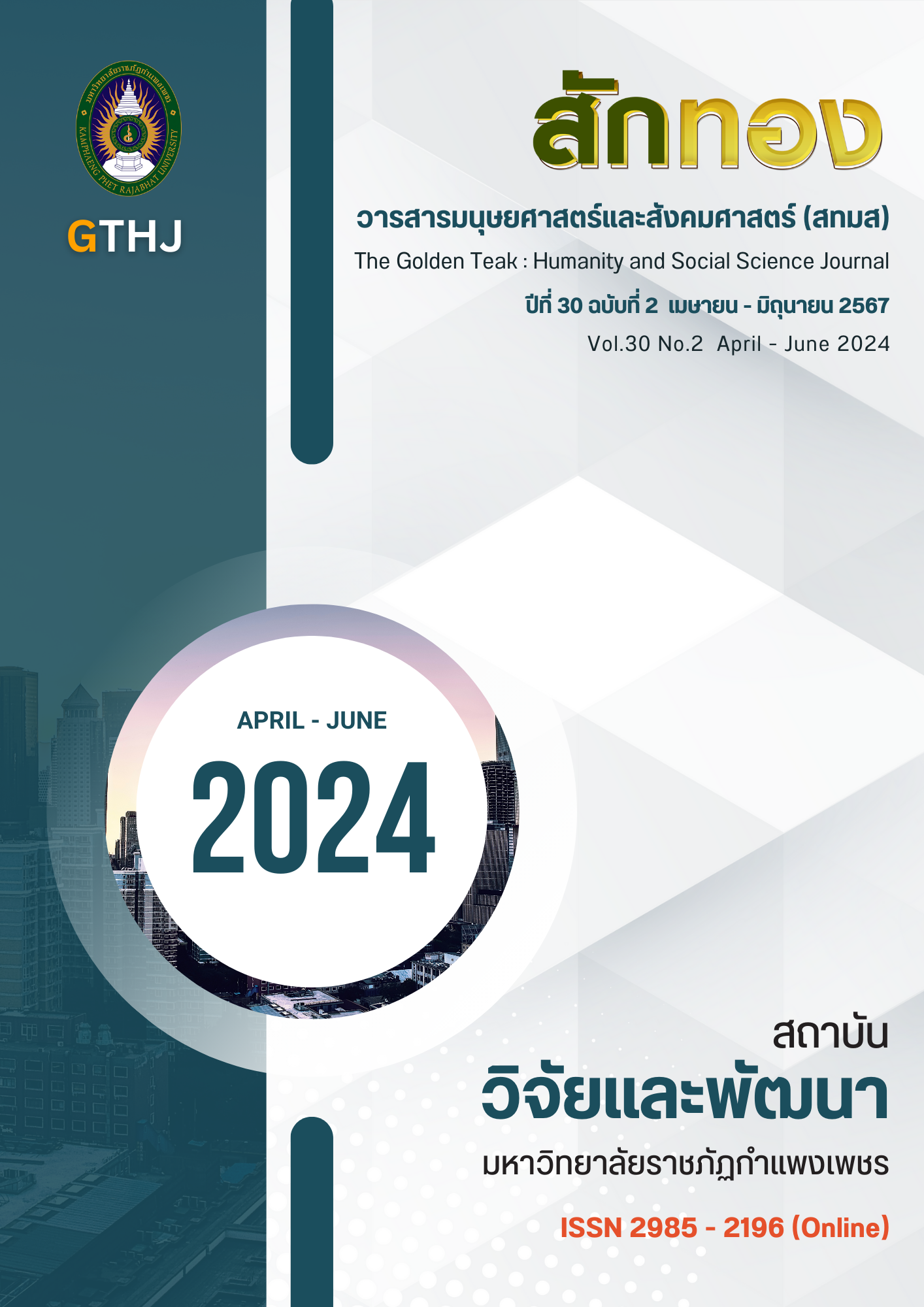Development of an Evaluation Model of Teacher Competency Based on the King’s Philosophy for Student Teacher of Rajabhat University : Applying the Theory-based Evaluation Approach
Main Article Content
Abstract
This research objectives of this research are to: The create the theory program of teacher competency based on the King’s philosophy and the development of the evaluation model for teacher competency based on the King’s philosophy of teacher students from Rajabhat University on the application of theory evaluation model. The research was separated into 2 steps. The first step was to create the theory program of teacher competency based on the King’s philosophy using integrative approach. The sample was the dean of the Faculty of Education and research instrument was an interview form on the development of the theory of teacher competency program according to King's philosophy of teacher students. The second step was to develop the assessment model for teacher competency according to the king’s philosophy of teacher students in Rajabhat Universities based on the application of theoretical evaluation model. The sample was the final year teacher students from Rajabhat University and research instrument was teacher competency assessment form. 1. The elements of theory program of teacher competency based on the king’s philosophy of teacher students in Rajabhat University were action model and change model of teacher competency based on the King’s philosophy. And creating theory program to structural equation model of teacher competency based on the King’s philosophy to use in the assessment and study the influencing factors to teacher competency based on the King’s philosophy. 2. The elements of the evaluation model for teacher competency based on the King’s philosophy of teacher students in Rajabhat University the applying of theory evaluation model were principle and reasons, objectives, targets, assessor and the person who being evaluation, the person who use the evaluation result, evaluation method, tools, criteria and report of the evaluation and the evaluation model procedures. The assessment results of teacher competency based on the King’s philosophy found that the overall assessment result, the intervention, the determinants, and the outcome were all at the decent level. 3. The analyzed the correlation coefficient of the structural equation model of teacher competency theory program based on the King's philosophy found that the correlation coefficient value of all the observable variables and all the latent variables had a significant statistic value. When analyzed the influence of variables in the structural equation model, researcher found that teacher competency based on the King’s philosophy was directly influenced by the learning management skill, relationship building skill between communities and student’s guardians, teacher’s spirit, and professional ethics.
Article Details

This work is licensed under a Creative Commons Attribution-NonCommercial-NoDerivatives 4.0 International License.
บทความที่ได้รับการตีพิมพ์เป็นลิขสิทธิ์ของวารสาร สักทอง : วารสารมนุษยศาสตร์และสังคมศาสตร์ สถาบันวิจัยและพัฒนา มหาวิทยาลับราชภัฏกำแพงเพชร
ข้อคิดเห็นใดๆ ที่ปรากฎในวารสารเป็นวรรณกรรมของผู้เขียนโดยเฉพาะ ซึ่งมหาวิทยาลัยราชภัฏกำแพงเพชรและบรรณาธิการไม่จำเป็นต้องเห็นด้วย
References
Adedokun, O., Childress, A. & Burgess, W. (2011). Testing Conceptual Frameworks of Nonexperimental Program Evaluation Designs Using Structural Equation Modeling. American Journal of Evaluation, 32, 480-493.
Chen, Huey. T. (1990). Theory-driven evaluations. Implementation Science. Routledge, 2022. 159-163.
Chen, Huey. T. (2005). Practical program evaluation: Assessing and improving planning, implementation and effectiveness. SAGE Publication Ltd. Thousand Oaks, California.
Kanchanawasi, S. (2011). Appraisal Theory. Bangkok : Press of Chulalongkorn University. [In Thai]
Kurusapha. (2020). Guidelines for teacher professional competency assessment: Operations and conduct according to professional standards. Bangkok : The teachers council of Thailand. [In Thai]
Mehlaman, N., Leksu, N., Mekdaeng, C. & Jindawat, W. (2020). The use of student activities to develop desirable characteristics wishes of Thai graduates. Academic journal Suvarnabhumi Institute of Technology, 6(2), 559-567. [In Thai]
Morten Balle Hansen and Evert Vedung. (2010). Theory-Based Stakeholder Evaluation. American Journal of Evaluation, 31(3), 295-313.
Piyapong, K. (2012). Development of program theory for evaluating the success of educational reform policy implementation in educational institutions using inductive and deductive methods. Ph.D. thesis Educational Measurement and Evaluation Chulalongkorn University. [In Thai]
Thammasit, P., Sichomphu, C. & Kamonworadet, Y. (2018). A model for developing student-teacher competency. for teaching practice in educational institutions. Journal of Graduate Studies and Social Sciences Uttaradit Rajabhat University, 8(1), 61-72. [In Thai]
Wongwang, A. (2014). The Development of an Activity Assessment Model to Promote Desirable Characteristics of Lower Secondary School Students. According to the concept of thrust theory. Ph.D. thesis Educational Measurement and Evaluation Chulalongkorn University. [In Thai]


